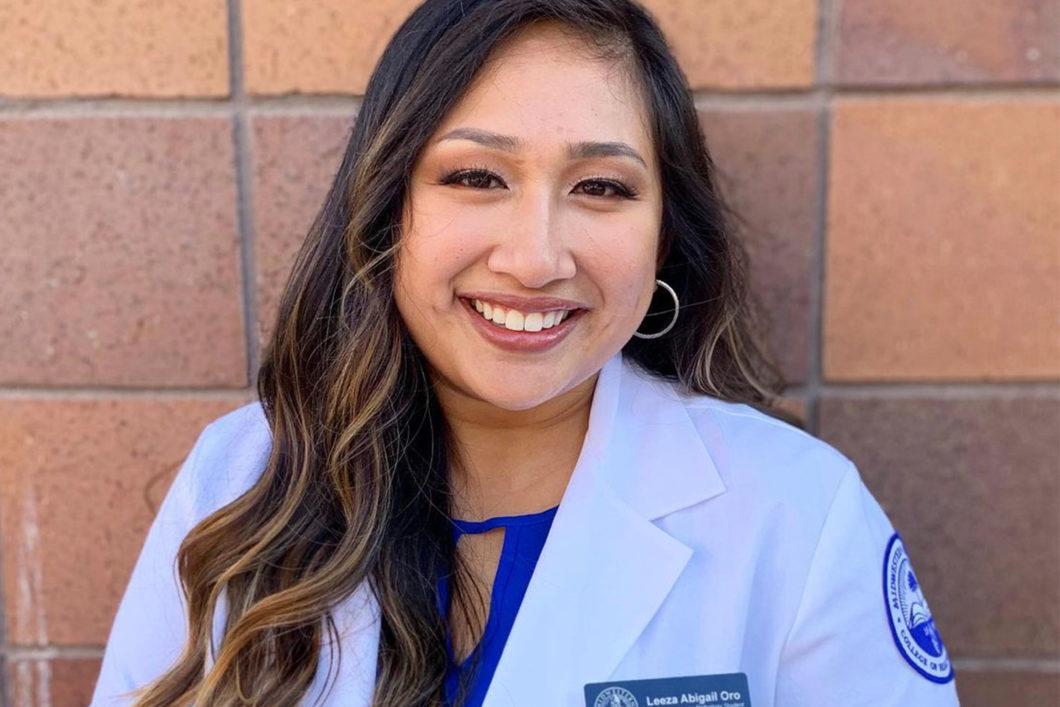As an SLP master’s degree student, Leeza Abigail “Abby” Oro (she/her) understands what many students experience—feelings of inadequacy. To push through these doubts, she turns each of her experiences into growth opportunities.
Quick Facts About Abby
- Graduate student at Midwestern University, Glendale (Arizona)
- Currently working at a post-acute rehab facility that serves individuals who have experienced TBI and stroke
- Dreams of providing speech-language pathology services in the areas of swallowing and voice
- LGBTQ+ Filipina-American plant mom who loves to travel and roller skate
- National NSSLHA member for 2 years
What’s Been Your Greatest Challenge as a CSD Student?
My greatest challenge has been being gentle with myself throughout my CSD education. I’ve questioned my competency as a future SLP when treatment planning, during unproductive sessions, and while fumbling through explanations to patients and their families. Eventually, I realized it’s okay to make mistakes and switched my mindset to strive for continuous improvement. It’s not fair to set unrealistic expectations for myself, especially as a newcomer to the field! Now, I focus more on speaking kindly to myself, learning how to bounce back when things go awry, and becoming comfortable asking for help.
What Advice Would You Give Fellow CSD Students Going Through Similar Challenges?
A professor once shared with me that the best SLPs aren’t the ones who perform well in clinic or academics 100% of the time . . . they’re the ones who embrace their experiences and continue to grow beyond graduate school.
This continues to resonate with me and change my perspective on my own clinical performance and interactions. Making mistakes is crucial to our learning. We should all continue to give ourselves permission to be imperfect, so we can be our best AuD- and SLP-selves!
What Motivates You to Wake Up and Pursue Speech-Language Pathology?
I’m constantly inspired by my patients and their motivation to improve. When parts of my private life aren’t going how I’d like, I know I can come to work and “check out” from my personal issues—focusing solely on my patients.
Focusing all my energy on them gives me confidence in return. I may be helping them overcome their communication barriers, but they’re also helping me believe in myself . . . which translates not only to my work life, but my personal life as well.
What Does National NSSLHA Membership Mean You?
Through my National NSSLHA membership, I’ve connected with colleagues who not only share similar speech-language pathology-related interests as me, but who are also diversifying the field and amplifying the voices of marginalized communities.
I was recently featured in a NSSLHA Blog post, Rising United in CSD: Perspectives from AAPI CSD Students, with Leila Regio [National NSSLHA’s VP for SSOs (Western Region)] and fellow National NSSLHA member, Nkauj-Huab Lo, where we dove deeper into being part of the AAPI communities in this a sensitive social climate.
It was also through Leila and our exchange of networks that I was fortunate enough to observe a mentor perform gender affirmative voice and treatment for several voice disorders. This opportunity concreted my desire to practice in the realm of swallowing and voice.
Networking with established clinicians who come from similar backgrounds has empowered me to own my identity as an LGBTQ+ Filipina-American and future SLP.

